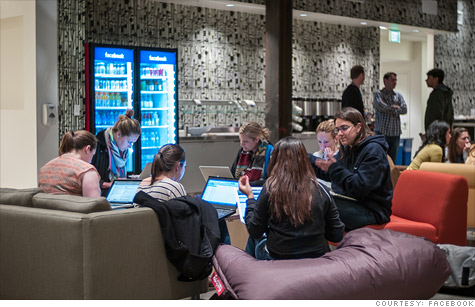Search News

Thousands of Facebook employees are now paper millionaires. Their next task: learning to manage that kind of windfall.
NEW YORK (CNNMoney) -- When Facebook CEO Mark Zuckerberg rang the Nasdaq opening bell on Friday to mark Facebook's public debut, he also rang in a crop of new millionaires and billionaires.
It's a rite of passage for Silicon Valley's most successful entrepreneurs and the employees who joined their ventures early -- and so is learning how to handle that fortune. Those who have been there before are full of advice.
"Buy one thing you've always wanted," suggests Karl Jacob, a serial entrepreneur and early Facebook (FB) advisor. "A lot of people don't celebrate the fact that they've worked really hard."
Color CEO Bill Nguyen -- who sold his last company, Lala, to Apple (AAPL, Fortune 500) in 2009 -- has a quirky suggestion: don't buy a house. Build one.
"It slows you down," he says. "All these things happen to you so quickly, you don't get the time to think about it."
Nguyen took his own advice. He used part of his fortune to build a thoroughly customized tropical compound on the shores of Maui's Mokuleia Bay.
The Bay Area's luxury toymakers are gleefully gearing up for the anticipated spending spree. Real estate agents are watching prices pop in Palo Alto, Facebook's new hometown, and local car dealers are revving their engines. One area Porsche dealer told CNNMoney that he's expanding his inventory.
When you hit the startup jackpot, there's two things people often do: "You buy a house or a car, or both," says tech veteran Rick Marini.
Marini sold his first company, Tickle Inc., to Monster (MWW) in 2004 for $30 million cash and a pile of stock. Ever the entrepreneur, he teamed with a friend who is a construction contractor to buy a San Francisco house that they hope to flip to a Facebook millionaire.
"It'll have all the gadgets and cutting-edge technology," Marini says of the lavish in-progress renovation.
Toys are nice, but there's one thing almost every tech entrepreneur who hits it big ends up lavishing cash on: more startups.
"It's almost a requirement," says Nat Turner, who sold his company, Invite Media, to Google (GOOG, Fortune 500) in 2010. "One of the big reasons Invite was successful was because of angel entrepreneurs."
Turner's collection of startups he's helped seed includes shopping site Milo (later acquired by eBay (EBAY, Fortune 500)), education site Lore, and ad-serving platform Adzerk.
Reddit founder Alexis Ohanian calls it "startup karma." After selling his own venture to Conde Nast in 2006, he earmarked 15% to 20% of his wealth for recycling into other startups. He created an "uncorporation," Breadpig, to house all of his ventures, with the profits donated to -- as he puts it -- "organizations and individuals that make the world less sucky."
But everyone has their splurge, too.
"I upgraded my dad's season tickets from nosebleeds to good seats. Redskins. I would fly home for those games," says Ohanian, a Maryland native.
Nguyen also indulged in some parental payback.
"The first thing I did," he says, "was buy my mom and dad a home."
-CNNMoney staff writer Julianne Pepitone contributed to this report. ![]()